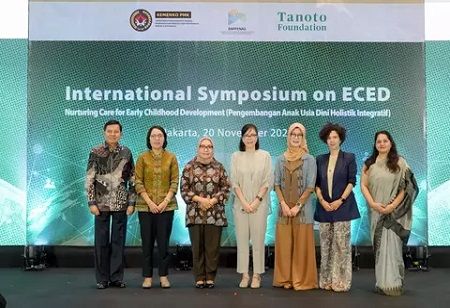Earlier this week, the Tanoto Foundation co-hosted with the Indonesian government the 2024 International Symposium on Early Childhood Education and Development in Jakarta. Co-partners representing government were the Coordinating Ministry for Cultural Affairs and Bappenas, National Development Planning Agency.
The symposium was organized as a response to the limited focus of early childhood development in Indonesia-the critical time for the development of human capital. Early childhood is often viewed primarily in terms of health and nutrition, while broader aspects such as responsive care and protection are overlooked. There is also a need for better coordination among service providers, who continue to operate in isolation.
The forum, under the theme 'Nurturing Care for Early Childhood Development', was aimed at bringing experts and stakeholders together in an exchange of research and best practices. Discussions included aligning early childhood development strategies in Indonesia with NCF, otherwise referred to as the Holistic and Integrative Early Childhood Development program.
The framework helps the countries realize the Sustainable Development Goals set by the UN, especially those related to early childhood, through better nutrition improvement, reduction of infant mortality, universal access to quality preschool education, and prevention of child abuse and neglect.
Minister for Women's Empowerment and Child Protection Arifah Fauzi said that the symposium's understanding would be used as a guide in developing the second cycle of the National Action Plan for PAUD HI, 2025-2029. The action plan helps enhance services on both central and regional levels to international standards. She also mentioned several ministry programs, such as the 'Ruang Bersama Merah Putih' initiative, which provides a joint space for women and children’s protection in villages, and the SAPA 129 hotline, along with a gender and children database.
Minister Arifah expressed gratitude to the Tanoto Foundation for initiating the symposium, emphasizing its role in strengthening collaboration among the government, civil society, and international organizations in supporting early childhood development.
Woro Srihastuti, deputy from the Coordinating Ministry for Human Capital, added that the Ruang Bersama Merah Putih program is an institutional cooperation programme. She stated that there is a need to redesign the measurement instrument of PAUD HI, adding that the current ECDI should be updated in order to more accurately appraise each component of PAUD HI.
Tanoto Foundation country head Inge Kusuma said the first 1,000 days are critical in child development as 80% brain development takes place within the first three years of life, peaking at one-year-old when cognitive, sensory, and language development is at its peak. Failure to intervene at such stages can lead to lifelong inadequate growth and development, she said.
Inge explained that the NCF and PAUD HI have an elaborate framework to set clear standards for optimal early childhood development. She appealed to all the stakeholders to reinforce commitment, commitment, and enhancement of their implementation in Indonesia.
The symposium was attended by speakers from the Coordinating Ministry for Cultural Affairs, Bappenas, the Ministry of Health, the National Nutrition Agency, and international representatives from organizations such as UNICEF EAPRO, UNICEF Indonesia, WHO, The World Bank, ARNEC, SEAMEO CECCEP, and local entities such as Ishk Tolaram, Tulodo, UPTD PPA Depok, and the Tanoto Foundation.

